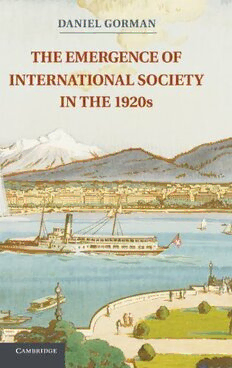
The Emergence of International Society in the 1920s PDF
Preview The Emergence of International Society in the 1920s
The Emergence of International Society in the 1920s Chronicling the emergence of an international society in the 1920s, Daniel Gorman describes how the shock of the First World War gave rise to a broad array of overlapping initiatives in international coop- eration. Though national rivalries continued to plague world politics, ordinary citizens and state officials found common causes in politics, religion, culture, and sport with peers beyond their borders. The League of Nations, the turn to a less centralized British Empire, the begin- ning of an international ecumenical movement, international sporting events, and audacious plans for the abolition of war all signalled inter- nationalism’s growth. State actors played an important role in these developments and were aided by international voluntary organiza- tions, church groups, and international networks of academics, ath- letes, women, pacifists, and humanitarian activists. These international networks became the forerunners of international non-governmental organizations (NGOs) and global governance. Daniel Gorman is associate professor of history and political science at the University of Waterloo and the Balsillie School of International Affairs. He is the author of Imperial Citizenship: Empire and the Question of Belonging (2007). He has contributed essays on aspects of the history of globalization to several books: Mobilities, Knowledge and Social Justice (2012), edited by Suzan Ilcan; Property, Territory, Globalization: Struggles over Autonomy (2011), edited by William Coleman; and Empires and Autonomy: Moments in the History of Globalization (2010), edited by Steven Streeter, John Weaver, and William Coleman. The Emergence of International Society in the 1920s DanIEl Gorman University of Waterloo, Canada cambridge university press Cambridge, New York, Melbourne, Madrid, Cape Town, Singapore, São Paulo, Delhi, Mexico City Cambridge University Press 32 Avenue of the Americas, New York, ny 10013-2473, usa www.cambridge.org Information on this title: www.cambridge.org/9781107021136 © Daniel Gorman 2012 This publication is in copyright. Subject to statutory exception and to the provisions of relevant collective licensing agreements, no reproduction of any part may take place without the written permission of Cambridge University Press. First published 2012 Printed in the United States of America A catalog record for this publication is available from the British Library. Library of Congress Cataloging in Publication data Gorman, Daniel, 1974– The emergence of international society in the 1920s / Daniel Gorman. pages cm Includes bibliographical references and index. isbn 978-1-107-02113-6 1. Internationalism – History – 20th century. 2. International cooperation – History – 20th century. I. Title. jz1308.g68 2012 327.1–dc23 2012003098 isbn 978-1-107-02113-6 Hardback Cambridge University Press has no responsibility for the persistence or accuracy of urls for external or third-party Internet Web sites referred to in this publication and does not guarantee that any content on such Web sites is, or will remain, accurate or appropriate. For Evan, Sam, and Ryan Contents List of Tables page viii Acknowledgements ix Abbreviations xi Introduction 1 Section I Imperial Internationalism 1 The Dominions and Britain in the 1920s 21 2 Servants of the World: Rachel Crowdy at the League of Nations 52 3 Moral Politics at the League of Nations and Its Imperial Ramifications 82 4 Conflict and Travail, Bitterness and Tears: Overseas Indians’ Failed Campaign for Imperial Citizenship 109 5 The Empire at Play, the Empire on Display: The 1911 Festival of Empire and the 1930 British Empire Games 149 Section II Trans-Atlantic Internationalism 6 Anglo-American Conceptions of International Society in the 1920s 175 7 Little More than a Hope? The World Alliance for Promoting International Friendship through the Churches 213 8 Internationalism by Decree: Outlawry of War and the Kellogg-Briand Pact 259 9 British and American Responses to the Kellogg-Briand Pact 285 Conclusion 309 Bibliography 321 Index 353 vii Tables 2.1. Survey of Causes of Prostitution in Britain, AMSH, 1916 page 77 4.1. Churchill’s 1922 Memorandum on Kenya, Including the Positions of the Settler and Indian Communities and Lord Coryndon 122 6.1. American Representatives at the League of Nations, 1920–30 186 viii
